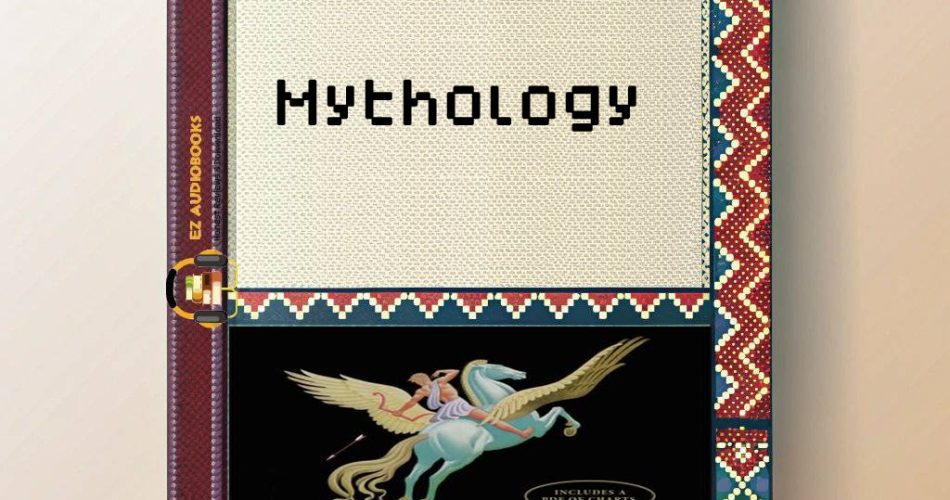Audiobook Sample
Listen to the sample to experience the story.
Please wait while we verify your browser...
- Title: Mythology
- Author: Edith Hamilton
- Narrator: Suzanne Toren
- Length: 14:36:27
- Version: Abridged
- Release Date: 30/04/2013
- Publisher: Hachette Book Group USA
- Genre: History, Fiction & Literature, Non-Fiction, Ancient Civilizations, Social Science, Literary Criticism
- ISBN13: 9.78E+12
As a literature professor with a deep-rooted passion for cross-cultural narratives, diving into Edith Hamilton’s ‘Mythology’ through the audiobook medium felt like unearthing a treasure trove of Western civilization’s foundational stories. This timeless collection, first published in 1942, offers an encyclopedic journey through Greek, Roman, and Norse myths, weaving tales of gods and heroes that have shaped art, literature, and cultural inquiry for centuries. What fascinates me most is how Hamilton distills these ancient stories into accessible prose, making them resonate with both curious readers and seasoned academics. Listening to this audiobook experience, narrated by the remarkable Suzanne Toren, I found myself transported to the dramatic landscapes of Mount Olympus and the icy realms of Asgard.
Through a cultural lens, Hamilton’s work serves as a keystone for understanding Western literary traditions. I recall a moment from my time as a visiting professor in Tokyo when I encountered Haruki Murakami’s ‘Kafka on the Shore.’ The interplay of myth and modernity in his work reminded me of how ancient stories continue to inform contemporary narratives. Similarly, Hamilton’s retelling of myths like the Trojan War and Odysseus’s wanderings feels strikingly relevant, echoing themes of human struggle and divine caprice that I’ve explored in my own seminars on literary theory. These stories aren’t just relics; they are living frameworks for understanding concepts like Freud’s Oedipus complex or Wagner’s operatic cycles – references Hamilton deftly highlights.
The content of ‘Mythology’ is a masterful blend of history, fiction, and literary criticism, covering iconic tales such as Jason and the Golden Fleece, Cupid and Psyche, and the transformative greed of King Midas. Hamilton’s scholarly approach ensures that each myth is contextualized within its cultural milieu, offering insights into ancient civilizations and social science perspectives. Her prose is both a reference text for scholars and a delightful read for casual enthusiasts, bridging the gap between academic rigor and storytelling charm. As someone who has spent years analyzing cultural contexts, I appreciate how she connects these myths to broader human experiences, from the naming of constellations to their influence on modern literature like Eugene O’Neill’s ‘Mourning Becomes Electra.’
Turning to the audiobook experience itself, Suzanne Toren’s narration is nothing short of captivating. Her voice carries the gravitas of a seasoned storyteller, imbuing each god and hero with distinct emotional depth. Whether she’s conveying the wrath of Zeus or the cunning of Loki, Toren’s tonal shifts and pacing create a vivid listening experience that rivals the best theatrical performances. I was particularly struck by her ability to handle the dense, expository sections – often a challenge in non-fiction audiobooks – with a clarity that keeps listeners engaged. The audio quality is pristine, with no distracting background noise, allowing the myths to take center stage. This reminds me of when I led a seminar at Berkeley comparing different storytelling mediums for ‘Cloud Atlas.’ Just as format influenced narrative perception there, Toren’s narration adds a layer of intimacy to Hamilton’s text, making the ancient feel immediate.
That said, I must offer a balanced perspective. While the audiobook excels in bringing these stories to life, its comprehensive nature can occasionally feel overwhelming for casual listeners. The sheer volume of myths and their interconnectedness might require pauses or supplementary notes for full appreciation, especially for those new to the genre of ancient civilizations or literary criticism. Additionally, while Toren’s narration is exceptional, her pacing in some of the denser genealogical sections might feel rushed to listeners unfamiliar with the material. However, these minor limitations hardly detract from the overall brilliance of this listening experience.
For comparison, I’d place Hamilton’s ‘Mythology’ alongside other seminal works in non-fiction and history, such as Joseph Campbell’s ‘The Hero with a Thousand Faces,’ which also explores mythic archetypes but with a more theoretical lens. While Campbell delves into the psychological underpinnings of myths, Hamilton prioritizes narrative accessibility, making her work a perfect entry point for those new to this field. In the audiobook realm, I’d also recommend exploring narrations of Ovid’s ‘Metamorphoses’ for a complementary dive into Roman myths, though few narrators match Toren’s commanding presence.
I’d recommend this audiobook to a wide audience – students of history and literary criticism, lovers of fiction and literature, and anyone intrigued by the roots of Western culture. It’s an ideal resource for educators seeking to introduce ancient civilizations in an engaging format, and for casual listeners, it offers a gateway to understanding the myths that permeate our language and art. The audiobook format enhances its accessibility, turning long commutes or quiet evenings into journeys through mythic realms. If you’re seeking a free audiobook experience, platforms often feature promotions for classics like this, so keep an eye out for opportunities to dive into this treasure at no cost.
Reflecting on my own journey with ‘Mythology,’ I’m reminded of why I fell in love with literature in the first place – the power of stories to transcend time and culture. Hamilton’s work, paired with Toren’s narration, reaffirms that myths are not mere tales but mirrors of the human condition. They challenge us to confront our flaws, celebrate our triumphs, and ponder the divine forces – real or imagined – that shape our lives. As I listened, I found myself revisiting my own academic path, from Yale to Harvard, where the study of narratives became my lens for understanding the world. This audiobook experience has enriched that lens, adding auditory depth to stories I’ve long cherished in print.
Until our next literary adventure, I wish you countless hours of inspired listening. May the tales of gods and heroes guide your own epic journeys, as they have mine. Warm regards, Prof. Emily Chen

